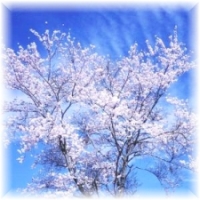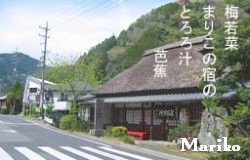|
Soushun no
Niwa wo megurite
Mon wo idezu
(Takahama Kyoshi)
I walked around my garden
in early spring,
but didn't go out of the gate.
(translated by sigmats)
On a sunny day seeming warm, I resolved
to walk on the street, but at last, ended up
walking only in my garden.
Izu
Izu wa atatakaku
Nojuku nimo yoroshii
Namioto mo.
(Taneda Santouka)
Izu has a nice, warm climate,
and is good for camping.
As well, the waves sound pleasant.
(translated by sigmats)
At first, this haiku was not "Nojuku nimo
yoroshii (= good for sleeping in the open),"
but "Shinuru ni yoroshii ( =good for dying)."
Santouka set out as a wanderer on a long journey
to seek a peaceful place to die, after his poetic
works met bankruptcy, and soon came to Izu in
Sizuoka pref., in April, 1936. His intention was to
die here. But the warm climate in Izu and the
warm-heart of his friend, with whom he drank
sake and talked over haiku, prevented him from
doing so.
© by Shigeki Matsumura 2004
Ume Wakana
Mariko no Shuku no
Tororo-jiru
(Matsuo Basho)
You will taste dainty grated yam soup at Mariko,
the post town of the Tokai Highway,
where Ume may be in bloom by now, with young herbs.
(translated by sigmats)
Mariko in Shizuoka city used to be the most important
post-town on theTokai Highway from Kyoto to Edo. Basho
composed this well-wishing haiku for his disciple about to start
for Edo from Otsu on February in 1691. The eating house for
grated yam soup is still in operation today, where people go and
taste the wonderful yam soup.
© by Shigeki Matsumura 2004
|











